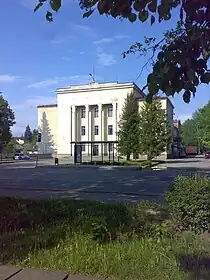nams
Latvian


Etymology
From Proto-Balto-Slavic *damús (“house”); The irregular d > n change in Baltic is attributed either to dissimilation (in expressions like darīt namu (“to make a house”)), or to influence from Iranic languages (compare Avestan 𐬥𐬨𐬁𐬥𐬀 (nmāna, “quarters, house”) alongside 𐬛𐬆𐬨𐬁𐬥𐬀 (dəmāna), suggesting the existence of an Iranian form *nam-). Another suggestion was that Proto-Baltic *nam- could come from *nm̥- < *dm̥-, the zero grade form of Proto-Indo-European *dṓm. Yet another possibility is the influence of the stem of words like Ancient Greek νέμω (némō, “to tend, to distribute, to take to pasture”), νομός (nomós, “pasture; division, distribution; residence, dwelling”). Cognates include Lithuanian nãmas, Old Church Slavonic домъ (domŭ), Belarusian дом (dom), Bulgarian дом (dom), Russian дом (dom), Ukrainian дім (dim), Czech dům (genitive domu), Polish dom, Sanskrit दम (dáma), Old Armenian տուն (tun), Ancient Greek δόμος (dómos), Latin domus.[1]
Pronunciation
| (file) |
Noun
nams m (1st declension)
- house, building (esp. big, multi-storey, in the city)
- dzīvojamais nams ― residential house
- daudzstāvu nams ― multi-storey house
- vairākdzīvokļu nams ― many-apartment house, building
- īres nams ― rent house (= apartment building, i.e., a building with apartments to rent)
- house, location (of a celebration)
- kāzu nams ― wedding house (= celebration)
- nama māte, namamāte ― hostess (of a party, celebration)
- a famous or rich family
- Rotšildu nams ― the house (= family) of Rothschild
- fairly large building, or part of a building, which usually has administrative, cultural, public or commercial functions
- zinātnes un tehnikas nams ― House of Science and Technology
- kultūras nams ― House of Culture
- sporta nams ― sports club
- mēbeļu nams ― furniture house
- bērnu nams, bērnunams ― children's home (= orphanage)
- Baltais nams ― the White House
Declension
Synonyms
References
- Karulis, Konstantīns (1992) “nams”, in Latviešu Etimoloģijas Vārdnīca (in Latvian), Rīga: AVOTS, →ISBN